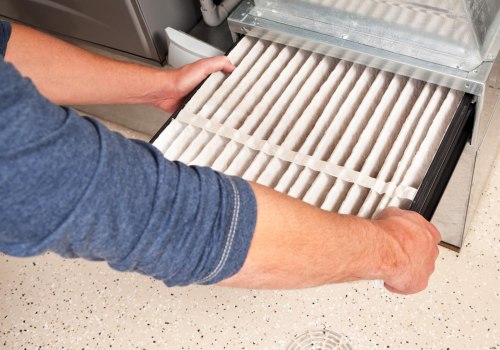A Comparison of the Best HVAC Home Air Filters Near Me
In the quest for top-notch HVAC home air filters, several factors need to balance out. These include quality, cost, allergen resistance, lifespan, and efficiency. Have a look at different types of filters available. Some come in pleated paper, others in synthetic variants, or even activated carbon. Each excels in pollutant retention capability in its unique way.
Remember, MERV ratings, material composition, and allergen trapping efficiency play crucial roles in filter selection. Filters serve a dual purpose. They not only trap dust, but also shield us from allergens.
Fiberglass filters, though easy on the wallet, require constant replacement. On the flip side, superior filters guarantee longevity, but they might increase energy consumption. To settle on the best pick, assessing your specific needs is crucial. This assessment aids in maintaining healthy indoor air quality.
Key Takeaways
HVAC home air filters of high ratings often consist of pleated paper, cloth, or synthetic fibers for effective pollutant entrapment. MERV grade 13-16 filters excel in residential settings, minimizing indoor pollutant exposure while offering superior durability. Filters designed to trap allergens, such as pleated and electrostatic types, provide protection against household allergens prevalent in many homes.
While initial costs for reusable filters may seem high, cost-benefit analysis reveals potential savings in the long run, with lifespans reaching up to a year. Several factors influence the appropriate filter choice, encompassing material composition, ease of installation, and specific needs within your living space.
Understanding HVAC Air Filters
HVAC air filters, often overlooked, are pivotal in maintaining indoor air quality and enhancing the performance of your heating and cooling system. These filters, designed with different materials, help in trapping diverse pollutants. Commonly used filter materials encompass fiberglass, pleated paper, along with synthetic fibers. Grasping the functionality of these materials can assist in making an optimal choice for your home.
Filters made of fiberglass are inexpensive and disposable, their primary function is to provide rudimentary protection. On the flip side, filters made from pleated paper offer superior filtration, capturing tinier particles. Synthetic filters top the list in efficiency, as they trap the minutest pollutants, thus delivering exceptional air quality.
As for installing these filters, the procedure is straightforward. Locate the filter compartment near your HVAC system's blower. Open this compartment, take out the old filter, and replace with a new one. Ensure the filter frame's arrows point towards the airflow direction. Regular changes of filters play a key role in sustaining system efficiency.
Importance of Quality Air Filters
You might wonder why you should care about the quality of your home's air filters. Consider this: the efficiency ratings of your filters directly impact your health and your wallet.
Air Filter Efficiency Ratings
Comprehending efficiency ratings of air filters proves essential for maintaining your home's air quality. These grades depend on the materials from which filters are made and their capability to retain pollutants.
Superior scores indicate better efficiency in capturing airborne particles. However, focus not solely on numbers. Interpretation of ratings matters as well.
A MERV grade between 13 to 16 suits residential dwellings best. Such filters utilize pleated synthetic cotton or polyester mixes, ensuring high efficiency.
Conversely, excessively high ratings might inhibit airflow, putting pressure on your HVAC system. Striking the right balance is key, along with understanding how these grades function and selecting the appropriate filter for your residence's air quality requirements.
Health Benefits of Filters
High-quality air filters are a beneficial investment for your health. They help in reducing the harmful pollutants that one gets exposed to indoors. Many people neglect indoor pollution, not realizing that it might be more detrimental than outdoor exposure. Installation of filters, although it might seem tedious, plays a crucial role in purifying indoor air.
Air filters work by trapping particles such as dust, pollen, mold spores, and pet dander, safeguarding individuals from allergies and respiratory ailments. Virus-bearing aerosols too are caught by filters, thereby minimizing infection risks. Harmful chemicals, which often come from paints, cleaners, or cooking, can also be eliminated by these filters. This ensures that the air you breathe indoors is cleaner and safer.
Longevity and Maintenance Costs
Air filters of superior quality not only promote healthier surroundings, but also promise extended durability and lower upkeep expenses. These filters are engineered to endure, translating into infrequent replacements and savings.
Disposal techniques for filters are of paramount importance too; superior filters often have recycling options, minimizing waste. Substandard filters can lead to increased energy use, which directly affects your utility expenses. Premium filters ensure efficient operation of your HVAC mechanism, thus cutting down power usage.
Keep in mind, an initial investment in a superior filter can result in long-term savings. You stand to gain from lesser replacements, environment-friendly disposal techniques, and reduced power usage. So, investing in superior quality for your HVAC system is a decision you'll cherish.
Top Rated HVAC Home Air Filters
A myriad of HVAC home air filters populate the market, but we'll be concentrating on those with top ratings, known for their outstanding performance. These superior air filters employ different materials, all specially designed to ensnare particles of various sizes and types. Some use pleated paper or cloth, while others incorporate synthetic fibers. For premium odor control, certain high-end options even feature activated charcoal.
Material selection in these filters isn't merely for particle trapping, it also greatly influences airflow in your HVAC system. Superior quality filter materials ensure optimal airflow, facilitating smooth and efficient operation of your system. Conversely, economical, inferior filters might hinder airflow, forcing your HVAC system to exert more effort, which could translate to increased energy expenditure.
In your quest for a high-performing HVAC air filter, remember to assess both the material of the filter and its potential impact on airflow. Top-notch filters strike an equilibrium between effective particle trapping and optimal airflow. This ensures not only easier breathing for you but also a more efficient HVAC system operation.
Comprehensive Filter Efficiency Comparison
Seeking the ideal equilibrium between HVAC performance and air purity? Let's conduct an in-depth comparison of filtration efficiency among diverse models.
Filter materials deserve your initial attention. Three prevalent types exist: fiberglass, pleated, and electrostatic. Fiberglass models, while economical, lack superior efficiency. Pleated variants, constructed from polyester or cotton, provide excellent filtration but might strain your HVAC system. Despite their high cost, electrostatic filters offer impressive efficiency and the ability to wash them.
Energy efficiency follows next in our discussion. Quality filters assist your HVAC system in running optimally by lowering the quantity of dust and debris that potentially clog the system. However, keep in mind that high-efficiency filters could make your system exert more effort, leading to a potential rise in energy usage.
What should we conclude from this? Striking a balance proves necessary. Those seeking high filtration without overloading their HVAC system might find a medium-efficiency pleated filter suitable. Conversely, if energy efficiency commands your focus, investing in a washable electrostatic filter might prove wise.
Allergen Removal Capabilities
When considering the best HVAC air filters for your home, it's critical to evaluate their allergen removal capabilities.
Let's discuss how different filter types target various allergens and the efficiency of these filters in trapping them.
Understanding these technologies can help you make an informed decision that meets your specific needs.
Efficiency in Allergen Removal
Efficiency in allergen removal becomes vital when striving for a spotless, healthy home environment. Such filters act as shields against allergens, not just dust catchers.
Identifying sources of allergens helps in choosing the most suitable filter. For example, if trees near your home are causing pollen issues or if pet dander is a concern, filters with high efficiency for such situations become crucial.
Also, consider seasonal allergies. Those afflicted with springtime allergies should opt for filters skilled at capturing tree and grass pollens. Understand that not every filter performs equally.
Selecting one capable of proficiently eliminating allergens specific to your home and season is paramount.
Filter Types and Allergens
In the vast universe of HVAC filters, numerous varieties are crafted to handle different allergen types. Materials used in these filters significantly determine their effectiveness. Pleated filters, utilizing polyester or cotton, excel in trapping dust mites along with mold spores. Contrarily, electrostatic filters, boasting self-charging fibers, skillfully ensnare tobacco smoke along with minuscule particles.
These filters also differ in their environmental impact. Some are disposable, adding to waste, while others are washable, hence reusable. Always bear in mind that a filter's allergen-reducing ability not only enhances your health but also affects our planet. So, make your choice with care!
Allergen Trapping Technologies
Air filters involve diverse allergen trapping techniques. These technologies significantly enhance their capability to remove allergens. Material selection for filters is crucial. Many filters utilize synthetic substances that carry an electrostatic charge. This charge attracts and secures allergens. Some contain layers of cotton or a polyester blend to ensnare harmful particles.
Cutting-edge technology is revolutionizing this field. For example, True HEPA filters have the ability to secure 99.97% of particles as minuscule as 0.3 microns. Among these particles are common allergens like dust mites, pet dander, and pollen. Activated carbon filters, on the other hand, can neutralize smells while securing allergens.
Hence, while choosing your next HVAC air filter, take into consideration its allergen trapping technique for superior indoor air quality.
Cost and Lifespan Analysis
Examining costs along with lifespan for the best HVAC home air filters near me aids in making knowledgeable choices. For costs, initial price plus related expenses figure in. Expenses associated can include disposal procedures for filters and effects on power consumption.
Disposal methods for filters contribute to their total cost. Some filters, being reusable, can lead to savings over a period. However, frequent cleaning, required for reusable filters, might consume considerable time. Conversely, initial cost-effectiveness of disposable filters might be misleading. Eventually, replacement costs, coupled with disposal's environmental impact, might accumulate.
Choice of filter also plays a role in power consumption. Superior quality filters might necessitate extra work from your HVAC system, leading to higher power bills. But, an inferior filter might let more dust and allergens circulate, deteriorating indoor air quality and potentially affecting health.
Lifespan for filters differs greatly, ranging from one month to one year, contingent on its quality and type. Pricier, high-end filters usually have longer lifespans. While considering cost, lifespan, and performance, strive for best value.
Making the Right Filter Choice
Filters for your home HVAC system come in a variety of materials, including fiberglass, pleated paper, and activated carbon. Each type boasts its strengths and weaknesses. For example, while fiberglass filters are cost-effective, frequent replacement becomes necessary. In contrast, filters made of activated carbon prove more durable, eliminating odors despite their higher price tag.
Installation of these filters varies in complexity. Some are straightforward, requiring no professional assistance, while others warrant more intricate procedures. Balancing ease of installation with filter performance is crucial.
High MERV rating doesn't always equate to a superior filter for your living space. Such filters might overwork your HVAC system, causing higher energy expenses and potential malfunctions.
Personalized needs such as allergies, pet dander, or dust management should guide your filter choice. Comprehending your specific situation allows you to select a suitable filter. After all, an ideal filter satisfies your budget constraints, improves air quality according to your needs, and features a manageable installation process.
Frequently Asked Questions
Can I Clean and Reuse My HVAC Air Filter?
Cleaning HVAC air filters for reuse isn't typical. Single use is their design, with lifespan varying. Once full, replacement is necessary. Filters made from reusable materials, although rare, can be cleaned for reuse.
Does the Air Filter Affect the HVAC Systems Energy Efficiency?
Indeed, air filters significantly influence HVAC systems' energy efficiency. Ensuring filters remain clean can augment energy savings while prolonging filter longevity, as this allows for smoother operation and reduced power consumption.
How Often Should I Change My HVAC Air Filter if I Have Pets?
Owning pets necessitates changing your HVAC air filter every two months. This practice helps mitigate pet allergies. Also, the selection of filter type is crucial—opt for one specially designed to trap pet dander.
What Is the Impact of Air Filters on Indoor Humidity Levels?
Indoor humidity levels undergo direct influence from air filters. These devices are crucial for controlling humidity, minimizing dampness. Inadequate control over humidity can invite health risks such as mold infestation. With an appropriate filter, you'll find respiration becomes easier.
Can the Wrong Size of an Air Filter Damage My HVAC System?
Absolutely, improper filter size can lead to significant damage to your HVAC system. Ensuring a correct fit of the filter proves essential to maintain efficient airflow and prevent strain on your HVAC system. Prioritize accurate sizing during filter replacement to maintain optimal performance and longevity of your system.







